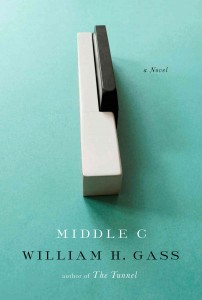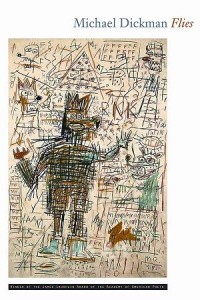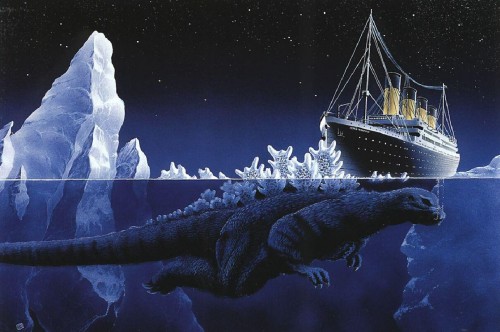Sunday Service: Matthew Fee poems
Ghostology
Your cupboard is not a ghost. Your lamp is not a
ghost. Your television is not a ghost. Your electric
toothbrush is not a ghost. The wind through the
open window is not a ghost. The reflection in the
mirror is not a ghost. The minivan in the street is
not a ghost. The doorbell is not a ghost. The man
in your closet is not a ghost. The man in your
living room is not a ghost. The man in your
bathroom is not a ghost. The man in your kitchen
is not a ghost. When this man puts his hands on
yours, they are not ghost hands but real hands.
When this man leans over in the middle of the
night and says, I love you, they are not ghost
words but real words. You are afraid.
The White Poet
The White Poet wanders through whiteness. He
considers the things that are white. The streets
are white. The hills are white. The moon is white.
The shadows are white. The vacant lot where
children are fighting in the rain is white in his
thoughts. In memory, his mother’s hands are
white and stained with white dirt. Everywhere he
turns, a policeman stands behind him, flashing
his white flashlight into his White Poet Eyes.
Matthew Fee is currently studying at the University of Utah. Recent work is published or forthcoming in journals such as The Laurel Review, Everyday Genius, Lemon Hound, Sixth Finch, Salamander, Hunger Mountain, and The Cortland Review. Find more at pointingatindigo.blogspot.com.
Tips For Getting Published
*****
[ …touched and overwhelmed by all the letters I get bemoaning the travails of getting published I spent the last few days locked up in my laboratory boiling my thoughts and advice down to the basics. The essentials.
Stick to my program and you’ll likely be a Bestseller before the cows come singing on down through their skulls full of rice (results not typical)… ]
*****
1) “It’s all about the writing”—well, you know, that’s absolute crap.
2)
If your nose
Aint brown, this book’s
Going down(like the Titanic, fire & Ice, blah, blah)
These sorts of mantras and reminders are vital. Tape this one on the wall over your desk. Engrave it on your sad, desperate brain.
3) Lie, beg, borrow, steal, squeal, bribe, flatter, romance, fuck, suck, READ MORE >
Lovely first part of a conversation for your crisp Saturday between Peter Gizzi and Clark Coolidge, hosted by Flying Object on March 29th, 2013.
Highlights include:
prodigal geology; Aram Saroyan getting stoned and staring at the word “oxygen”; being hungry and new; getting to Heaven and everyone saying “Hey, not bad, kid”; the only composer who was at his centennial concert; writing sonnets without thinking about it; the imprints of giant poems; musical lifts; Robert Lowell stopping in the middle of a poem and going “And this is the important line”; losing words to your handwriting; riding signals; improvisational notebook sizes.
9/11 and Make-Believe

On the day when al-Qaeda toppled the Twin Towers with commercial airplanes I was very upset, not because thousands of Americans had just died, but because the snack that my mommy always had in the car when she picked me up form school — a yummy, delicious, chocolaty, nutty, and creamy Snickers — had melted.
A lot of people seem to be very perturbed by 9/11, and these types are, according to me, phony, stupid, or both. What turns 9/11 into a tragedy isn’t that tons of humans beings die. Tons of humans beings die all of the time. Right now around 5,000 Syrians are dying per month, and only a tiny percentage of Americans seem to care enough to do anything. 9/11, though, is different because, as Noam Chomsky says, “For the first time, the guns have been directed the other way. That is a dramatic change.” Normally, America’s the country who gets to be grandly violent, like when Bill Clinton sundered a Sudanese pharmaceutical plant, decimating their medicine supplies, causing thousands to die from treatable diseases. But on 9/11 the opposite occurred. The country whose interests, according to Woodrow Wilson, “must march forward” got gashed. People — white people, Capitalist people, Western people — who weren’t supposed to die, died.
The controversial French boy, Jean Baudrillard, says that 9/11 made our “fantasies real.” All of those terrific and terrifying disaster movies — Independence Day, the Transformers, Schindler’s List — had tumbled into America’s tangible territory. The acts actually annihilated USA bodies. But just because Jean used the word “real” doesn’t make it so. For Jean, “reality only exists to the extent that we can intervene in it. But when something emerges that we cannot change in any way, even with the imagination, something that escapes all representation, then it simply expels us.” Just as I can’t kiss that cute Nazi boy in Schindler’s List, nobody was able to cease the Twin Towers’ collapse.
On Identity in William Gass’s Middle C
 Middle C
Middle C
by William Gass
Knopf, March 2013
416 pages / $28.95 Buy from Amazon
In a recent interview with the Los Angeles review of Books, William Gass cited a fellow titan of high postmodernism when asked about the role of obsession in his fiction. “[William] Gaddis maintained that the writer needed an obsession; he or she would then worry about it like a cat with a rag. The obsession may be hard to spot and it took me some time to discover mine: the stupidity of mankind, its misuse of reason.”
If the common thread of Gass’s fiction has ever been too translucent or opaque to put your finger on, with that sentence he gave us the decoder key to his entire oeuvre.
And where do human beings misuse their reason more than in regard their own self-image? This is the question that Gass chooses to plumb in Middle C, just the third full-length novel of his otherwise prolific career.
Middle C, in the makings for a decade and a half, comes along at a time when neuroscience is probing more and more deeply (and for some, uncomfortably) at the question of what exactly makes us us. Experimental psychologist and author Bruce Hood opined in his 2012 book, The Self Illusion, “If we are so susceptible to group pressure, subtle priming cues, stereotyping and culturally cuing, then the notion of a true, unyielding ego self cannot be sustained. If it is a self that flinches and bends with tiny changes in circumstances, then it might as well be non-existent.”
And it’s hard to argue. We are funny creatures that, largely through trial and error in testing social boundaries, concoct these permanent-if-illusory entities we like to call selves, ideas which are only further hardened whenever they are challenged by evidence of their amorphousness. Or, as it’s elegantly put with regard to our protagonist, “In Joey’s case, ignorance encouraged certainty.”
But before we ever meet Joey, aka Professor Joseph Skizzen, we are introduced to his father, an Austrian patriarch named Rudi Skizzen who decides to give he and his family new, Jewish identities in order to escape the advancing Nazis and gain asylum in England, where Joseph is born as Yussel Fixel. Of course, all along we have the sneaking suspicion that Rudi is less concerned with his family’s safety or complicity in the atrocities to come, and more ashamed of — or maybe even just bored of — his Austrianness.
In England, with wartime sympathy for the refugee class waning, Rudi reinvents himself once again as janitor and gambling man Raymond Scofield, before his ultimate dematerialization, leaving his family behind and, we’re lead to believe, making off for the New World
The story then picks up in Ulrichstown, Ohio with Joseph, who, right from adolescence, seems uncomfortable as a member of the human race. As he would express as a more articulate — and equally rancorous — adult, “the desires that men displayed, either alone, at social clubs, in political parties, or as communities, leagues, and nations, were fundamentally so measly and uninteresting, and the methods employed to achieve them so borrowed, makeshift, and inadequate, that what was eventually obtained was a shambles, leaving their suitors dissatisfied, angry, and searching for more satisfactory targets.”
Still, in a fit of irony, Joseph discovered something he did want to be: Austrian. And an educated Austrian he would become. Using his imagined Austrian upbringing and a love for “difficult” modern music to boost his air of superiority, Joseph lucks and feigns his way into a position as Professor of Modern Music at the tiny, austere Whittlebauer College, a position for which he is, er, under qualified for, by some measure.
September 13th, 2013 / 11:05 am
Flies by Michael Dickman
 Flies
Flies
by Michael Dickman
Copper Canyon Press, 2011
96 pages / $16 Buy from Copper Canyon Press or Amazon
Upon a first reading of Michael Dickman’s Flies, a reader might be left with impressions abrupt and violent. Perhaps one cannot be blamed for this reaction; the collection oozes strangely enjambed lines and macabre content frequently addressing dark, untimely deaths. Flies, however, does much more than induce the unsettling awe an audience might expect from a horror film, although it does that, too. As a reader takes the time to know and understand the collection — perhaps not so unlike how time is necessary to begin to grieve and to start to heal — we learn that Dickman’s lines are not haphazardly clipped with the sole purpose of creating unexpected suspense and terror, but rather masterfully guide the reader with a humane, almost gentle subtlety.
Flies opens with the poem “Dead Brother Superhero.” The first lines read:
You don’t have to be
afraid (3)
Falling barely short of an end-stop, the first line, “You don’t have to be,” ever so subtly juxtaposes the state of being, via “to be,” with quite the opposite, the dead, as mentioned in the title “Dead Brother Superhero.” This comparative device, in combination with the apotheosis found within the title, results in a grievous, heartfelt magnification of the brother’s deadness.
At other times Dickman’s line breaks summon a subtle duality. In “Emily Dickinson to the Rescue”, the poet writes:
Her legs pumping
her heart
out (22)
Although the speaker states, “Her legs pumping,” perhaps a pumping heart is an even more natural image. Dickman, of course, resists this more traditional description and repetition. He does not write “Her heart pumping.” Instead the piece surprises us with “her heart / out.” Nevertheless, due to the visual layout of the stanza, it is not too far fetched to envision her heart pumping, as we the readers might even go so far as to imagine the slipping down of the verb “pumping” to substitute for that blaring white space. The audience is left with a delicate duality of sorts. We might visualize the image as written of a “heart / out,” perhaps as if wearing one’s heart on her sleeve, but there is also the quietly suggestive nod toward a heart pumping out as it might while bleeding out during the last moments of life.
The second section of the opening poem closes with the lines:
Any second now
Any second
now (4)
Dickman frequently resists more traditional forms of repetition. The phrase, “Any second now,” is repeated but with the variation of a line break. This technique creates an effect within the poem. The language itself is subtly ambiguous. Breaking the line “Any second / now” permits two reading. Firstly, we are allowed a reading identical to the first phrase without a line break, a straight repetition of what precedes. Additionally, due to the enjambement, a second meaning — that the “now” has actually arrived — is possible. If the poem stated, “Any second now / any second now,” we as readers would be left waiting with the speaker for whatever event he is anxiously anticipating. However, because the repetition is varied by the line break we may interpret the “now” both as not yet having arrived and also as having arrived. Due to the poet’s enjambment and, therefore, the emphasis of the second “now” which closes the section, we as readers can be hopeful but not certain that the awaited time has come.
September 13th, 2013 / 11:00 am
“The problem with creative-writing programs is not the quality of instruction; it’s the enforced isolation with other people who are thinking, eating, and breathing the same things you are.”
from the Reddit AMA with the editors of The Paris Review.
Other highlights: They receive (roughly) 15,000 submissions a year; they will never be “online only” (shouts to trees); they like New York Tyrant; Lorin Stein drinks espresso.
25 Points: Memories of Underdevelopment
 Memories of Underdevelopment
Memories of Underdevelopment
by Edmundo Desnoes, translated by Al Schaller
Latin American Literary Review Press, 2004
110 pages / $15.00 buy from LALRP
1. Memorias del subdesarrollo. Or call it Inconsolable Memories, which shows up in the subtitles of Tomás Gutiérrez Alea’s film adaptation, and is itself a wish taken from Hiroshima, Mon Amour, one of the narrator’s favorite movies. J’ai désiré avoir l’inconsolable mémoire.
2. I’ve looked up “underdevelopment” in the dictionary twenty times since seeing the film and reading the book. I’m waiting for the definition to say: a better word for this word is subdesarrollo.
3. The film was shown during Revolution in the Air: The Long Sixties.
4. The longer the 60s, the shorter the 50s and 70s.
5. We’re talking about how to get to Cuba the way our grandparents talked about how to get to the suburbs and their parents wondered how to get west. “I already know the United States, but what will happen here is a mystery to me.”
6. The author photo shows Edmundo Desnoes with full white beard, pipe in mouth, arms over his head in a pose of relaxation, not surrender. “The first responsibility of a writer is to survive.”
7. Reading books after seeing the movie. I made this mistake with The Firm. Even though I find Jeanne Tripplehorn attractive, and love typing out her name, Abby McDeere is shapelier on the page.
8. The novel’s first person antihero, Sergio Malabre, has less poise/élan than a Grisham creation (or Tao Lin) and believes himself, like so many first persons, to be the last man. He’s not a drinker but there’s probably something wrong with his liver. With his wife and family off to America he decides to stay in Cuba, an island he calls a trap, and to live amongst a revolution he calls a tragedy. On a crowded bus he feels like slime. “I am 39 years old and already an old man. I feel stupid. More rotten than mature.” The theme of rottenness in Memories of Underdevelopment is slightly less romantic than DeLillo’s “apple core going sepia” at the close of Underworld. Sergio, our rotten and rotting antihero, is play acting through the period drama of the future. His actual life is something Donald Draper will make a Park Avenue Sad Face about. He does not want what he wants. He does not want the historical anchors his country offers him. In protest, he removes the timestamps from his journal midway through the novel because he believes dates are meaningless. July 26, 1953. April 17, 1961. October 14, 1962. He’s a cultured, good-looking, overripe intellectual educated in New York and Paris (he’s done the 90 miles; no matter how far away it is, it’s always the 90 miles) who wants to know less, who wants to be stupider. #bayofpigs #Octobercrisis #CMC #gameofchicken.
9. As self-aware as Ben Lerner’s cipher in Leaving the Atocha Station, who, following the 2004 Madrid bombings, finds the air alive “less with the excitement of a period than with the excitement of periodization.”
10. Sergio, on a walk through the Hemingway house museum: “Americans have an artificial smell, and the Russians stink.” READ MORE >
September 12th, 2013 / 3:08 pm
Brian McGuigan (of Seattle) talks Tao, Junot Diaz, Guns, Poetry Readings, etc……
*****
*****
Rauan: so what do you think of Tao Lin’s prose?
Brian McGuigan: Tao Lin is the literary equivalent of Nascar without the excitement of car crashes. I know people out there love his work (as there are many out there, like me, who don’t), but reading his prose is like watching cars drive in circles. His sentences lack much pulse. The verbs don’t twerk–they don’t even do the Hokie Pokie. They just lay there flat, motionless, like sex you don’t really want to have but you’re doing it because you know your partner wants it and you just want to go to bed. I feel the same about Lin’s dialogue, which is often cited as his skill, but it reads like a bad Miranda July movie, overcooked and unsalted. There’s just no spice. The sum of it all reminds me of writing I read in college workshops over a decade ago. If I could ever make it through one of his novels (Twenty pages into “Richard Yates” I chucked the book on the floor of a beloved Seattle indie bookstore and walked out.), I’d have red-penned the shit out of it. I’ve never understood the hype around Tao Lin. His writing just isn’t for me.
*****
*****
Okay, so that was the first part of my latest Seattle Author Spotlight (# 8, featuring Brian McGuigan).
*****
Brian was, until quite recently, the program director at Hugo House. Brian’s still involved with Hugo House, curating among other events his regular and extremely popular Cheap Wine/Beer & Poetry/Prose nights, but now, after the success of his essay My fantasies of mass murder at Salon, Brian spends most of his working hours on a memoir regarding his experiences with violence, guns, etc. Brian McGuigan is street wise, a damned hard worker and has an excellent and elegant sense of humor. Coming out of a tough Irish family Brian certainly has toughness also and, though I don’t think he’s been to Ireland, Brian speaks as though he’s kissed the Blarney Stone several times! It was great chatting with him in preparation for this Spotlight.
And, to follow then READ MORE >
I just rediscovered this yesterday and it’s fucking hilarious and some of you have probably seen this before but if you haven’t yet, it’s seriously brilliant, and wth, sometimes we just really, really need to laugh at things: Hyperbole and a Half: How a Fish Almost Destroyed My Childhood & also this, because it’s funny and right on: Depression Ok, that is all. Return to whatever it was that you were doing.




